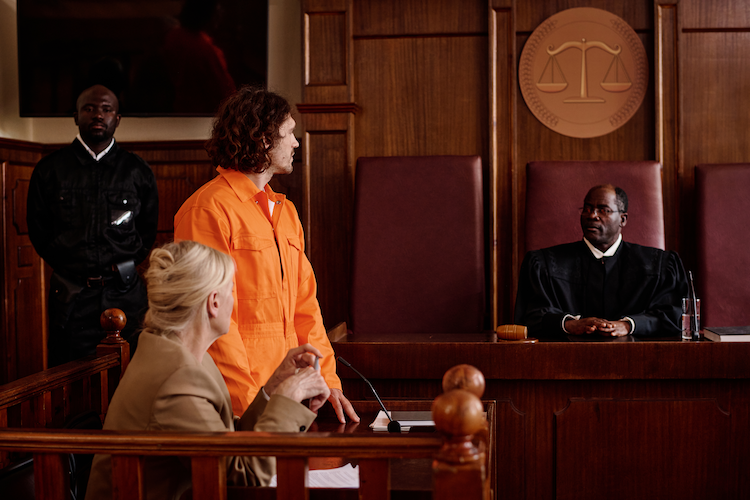SCOTUS to Take on Sixth Amendment’s Confrontation Clause

The U.S. Supreme Court’s January docket features several closely watched cases involving constitutional law. In Smith v. Arizona, the justices will address whether the Confrontation Clause of the Sixth Amendment permits the prosecution in a criminal trial to present testimony by a substitute expert conveying the testimonial statements of a non-testifying forensic analyst.
Facts of the Case
Jason Smith was convicted and sentenced for possessing dangerous drugs, marijuana for sale, narcotic drugs, and drug paraphernalia. At the trial, the State of Arizona called Department of Public Safety (DPS) forensic scientist Greggory Longoni, who testified that the seized substances were methamphetamine, marijuana, and cannabis. Although Longoni offered his independent opinions, he reached his conclusions based on his review of testing conducted by former DPS forensic scientist Elizabeth Rast, who did not testify.
In appealing his conviction, Smith argued that the superior court violated rights under the Constitution’s Confrontation Clause by admitting Longoni’s testimony because Longoni formed his opinions by relying on a non-testifying expert’s analysis. The Sixth Amendment’s Confrontation Clause states that “In all criminal prosecutions, the accused shall enjoy the right … to be confronted with the witnesses against him.”
The Arizona Court of Appeals affirmed the conviction, holding that Longoni’s testimony did not violate the Confrontation Clause. In support, the court reasoned that “Longoni presented his independent expert opinions permissibly based on his review of Rast’s work” and that an expert may “testif[y] ‘to otherwise inadmissible evidence, including the substance of a non-testifying expert’s analysis, if such evidence forms the basis of the expert’s opinion.’”
Issues Before the Supreme Court
In appealing to the U.S. Supreme Court, Smith argues that the rationales applied by the Arizona Court of Appeals and similarly applied by other lower courts do not comport with, and “threaten to swallow,” the Confrontation Clause.
Smith also cited the divide among lower courts over admitting substitute expert testimony. As Smith noted in his petition for certiorari, the Supreme Court held in Bullcoming v. New Mexico, 564 U.S. 647 (2011), that when the prosecution in a criminal trial introduces a forensic analyst’s certifications, the analyst becomes a witness whom the defendant has a Sixth Amendment right to confront—a right that is not satisfied by cross-examining a substitute expert. While the Supreme Court granted review in Williams v. Illinois, 567 U.S. 50 (2012) to address where “an expert witness [i]s asked for his independent opinion about underlying testimonial reports that were not themselves admitted into evidence” the Court issued a fractured 4-1-4 decision. As a result, state high courts and federal courts of appeals have failed to reach a consensus on the issue.
The Supreme Court granted certiorari on September 29, 2023. The justices have agreed to consider the following question:
Whether the Confrontation Clause of the Sixth Amendment permits the prosecution in a criminal trial to present testimony by a substitute expert conveying the testimonial statements of a nontestifying forensic analyst, on the grounds that (a) the testifying expert offers some independent opinion and the analyst’s statements are offered not for their truth but to explain the expert’s opinion, and (b) the defendant did not independently seek to subpoena the analyst.
Oral arguments are scheduled for January 10, 2024. A decision is expected before the term ends in June.
Previous Articles
SCOTUS Rules State Can’t Immunize Parties from Federal Civil Liability
by DONALD SCARINCI on January 29, 2026
In John Doe v. Dynamic Physical Therapy, LLC, 607 U.S. ____ (2025) the U.S. Supreme Court held that...
Supreme Court to Address Racial Discrimination in Jury Selection
by DONALD SCARINCI onWhile the U.S. Supreme Court has concluded oral arguments for the year, it continues to add cases t...
Supreme Court Halts Deployment of National Guard to Chicago
by DONALD SCARINCI on
In Trump v. Illinois, 607 U.S. ____ (2025), the U.S. Supreme Court refused to stay a district court...
The Amendments
-
Amendment1
- Establishment ClauseFree Exercise Clause
- Freedom of Speech
- Freedoms of Press
- Freedom of Assembly, and Petitition
-
Amendment2
- The Right to Bear Arms
-
Amendment4
- Unreasonable Searches and Seizures
-
Amendment5
- Due Process
- Eminent Domain
- Rights of Criminal Defendants
Preamble to the Bill of Rights
Congress of the United States begun and held at the City of New-York, on Wednesday the fourth of March, one thousand seven hundred and eighty nine.
THE Conventions of a number of the States, having at the time of their adopting the Constitution, expressed a desire, in order to prevent misconstruction or abuse of its powers, that further declaratory and restrictive clauses should be added: And as extending the ground of public confidence in the Government, will best ensure the beneficent ends of its institution.





